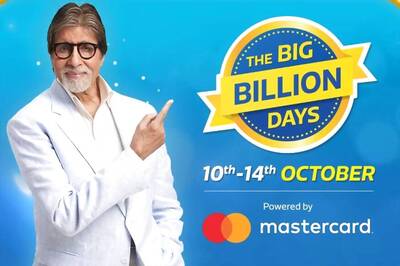
views
Different Ways to Write an After-Interview Thank You Email Subject Line
Offer a general, polite thank you. You don’t have to overcomplicate your subject line, especially if you’re in a hurry or stressed out about the whole thing. There’s nothing wrong with a simple thank you; your interviewer will understand the purpose of the email easily enough. You can also thank them for meeting with you, talking, chatting, and so on. For example: Thank you for meeting with me! Thanks for your time today Thank you for a great interview I enjoyed meeting with you! Thank you for the opportunity! Thank you for talking to me today!
Include the date of the job interview. This is a good idea if you don’t follow up with a thank-you email the same day as the interview. Hiring managers tend to hold multiple interviews over a few days or even weeks, so including the date can help jog their memory before they even open the email. It’ll also encourage them to respond to you faster. Thank you for your time (Interview on Sept. 5) Thank you for the interview on Friday It was great to speak with you on Wednesday!
Specify the position that you interviewed for. A hiring manager may also be interviewing for different positions. By specifying the one you want, you can remind them of your interview, clarify what the email is about, and show the interviewer that the email is an important one. Just make sure you’re using the official position title used by that company! For example: Thank you for speaking with me about the editorial assistant position! Thank you for considering me as your new quality assurance specialist. Thank you: Marketing Manager interview with ABCD-Company.
Personalize the subject line with your interviewer’s name. This is an easy way to get the interviewer’s attention and build a little extra rapport, even after the interview itself. Be sure to use the name that the interviewer uses themselves—and if you’re not sure, check an email from them to see how they introduce themselves or sign off. Thanks for meeting with me, Noah! Thanks so much for your time, Janice Thank you for a great interview, Kim!
Add a detail from the interview. In your subject line, briefly reference something you and your interviewer discussed. This can help remind them about one of the better moments in the interview and show them it was memorable for you, too. In short, it can make you stand out from the crowd a bit more. Thanks for the great chat about marketing and latte flavors! Thank you for sharing your accounting advice!
Ask the interviewer a question in the subject line. Interviewers don’t always reply to thank you emails—so if you want to encourage a reply, try putting a question right in the subject line. It’ll grab their attention and demonstrate your interest in the job; it may even boost your chances of getting the job. Try asking a question about the job or see if you can get feedback from them. For example: Thank you for the interview! Need anything else? Great to meet you! More work samples needed? Thanks for meeting with me - any feedback? Thanks for the interview + question about next steps
Indicate that you have more information to share. Are there any details you didn’t get to talk about during the interview? If so, you can try sharing them in your thank you email instead. This can give you some extra space to show your interviewer why you’re a great fit for the job; you could send them some specific work samples, for example, or answer a question you didn’t fully get to in the interview. Thank you for the interview! Here’s the requested work sample. Thanks for meeting me + Another thing I wanted to mention!
Compliment the interviewer in some way. It’s never a bad idea to recognize their professional skills or expertise. A thoughtful compliment can help build your relationship with the interviewer and show them that you genuinely appreciated meeting them and learning a little bit about the job (and possibly the industry or specific job skills) from them. Thank you for your guidance and valuable insights! Grateful for your advice on breaking into the industry Thanks for sharing your passion and expertise!
Why are thank-you email subject lines important?
A great subject line can get your interviewer to notice and read the email. As we mentioned above, hiring managers often interview a lot of people (and see even more applications) over the entire hiring process. Sending a follow-up thank you email is a great way to stand out and build rapport with them—and a polite, appreciative subject line can help the email itself stand out, too. With a strong subject line, interviewers are more likely to recognize your name and associate you with consistent communication (and a friendly, professional attitude).
Advice for Writing an Email Subject Line
Write a clear and easily understandable subject line. No need to beat around the bush; your interviewer should know what the email is about from the subject line alone. That’s why we also recommended adding details (like the job title or date of the interview) in your subject line; the more information they have, the more easily interviewers will remember you.
Keep your subject line concise. As important as detail is, you should also limit the length of your subject line. There’s only so much space, especially if you don’t want it to get cut off (either on a desktop or mobile phone). There’s no clear character limit since different devices and platforms have different display settings; generally, try to keep the subject line as short as possible (while still being clear and polite).
Advice for Writing a Thank-You Email After an Interview
Get right to the point. Just like your subject line, the actual email should be brief, polite, and concise. Start with a thank you and reiterate how interested you are in the position you interviewed for. After that, you can move into the body of the email.
Include a couple of brief paragraphs. In the body of your email, you can remind the interviewer of your qualifications and expertise—anything that would make you the best fit for the job. This inclues key skills that were emphasized in the job description or by the interviewer, as well as contributions you hope to make if you’re hired. Here’s an outline of things to include: Remind them why you want the job. Your thank you email should highlight your interest in the job itself, so make an effort to “sell” yourself a little. Summarize your experience. Are there any specific qualifications you want the interviewer to remember? Restate them here. Cover anything you missed before. If you have any work samples, portfolio links, or additional qualifications or experience you didn’t talk about during the interview, mention it in your email. Address any concerns. If you feel like you didn’t fully answer a question (or didn’t answer it the way you wanted to), take the opportunity to fix that by explaining your answer more clearly in the email. You can also ask any follow-up questions you didn’t think of before.
End the email with a signature. When you’re ready to close your email, sign off with a professional signature, including your contact information so the interviewer knows exactly how to get in touch with you if needed. For example: Sincerely, Your NameEmail: [email protected]: 555-555-5555Professional website (optional)LinkedIn URL or professional social media pages (optional)
Personalize each thank-you email. If you do several interviews and send just as many thank you emails, it might be tempting to copy and paste the same one—but resist that urge! It’s best to customize each email and mention a few details specific to the interview in question, especially if you’re emailing different people at the same company. They should feel like they got a personalized email, not a cookie-cutter one.




















Comments
0 comment